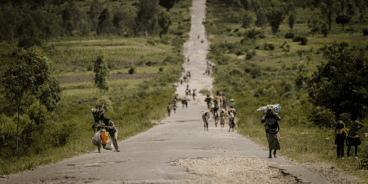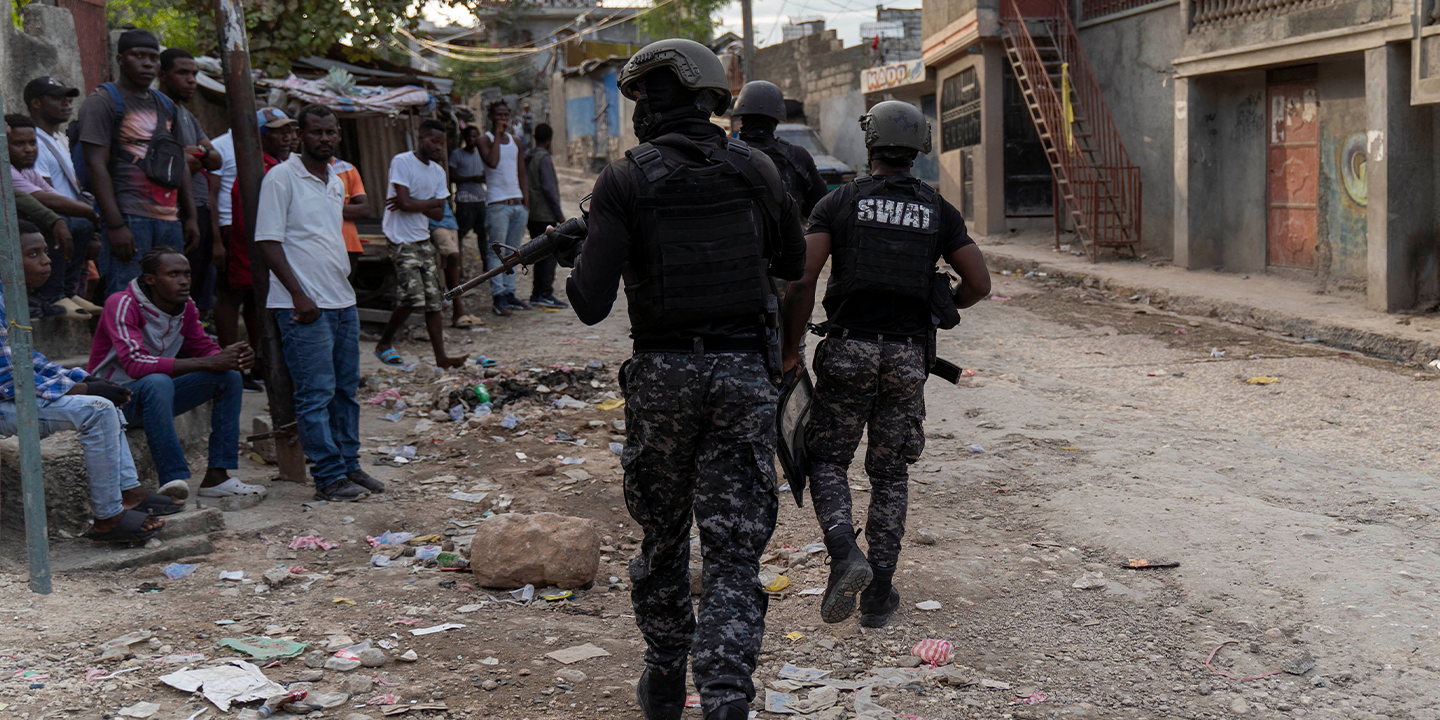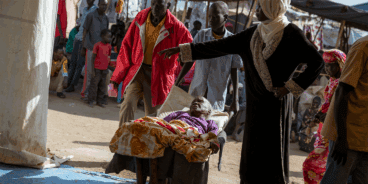

Atrocity Alert No. 363: Haiti, Ethiopia and Democratic Republic of the Congo
Atrocity Alert is a weekly publication by the Global Centre for the Responsibility to Protect highlighting situations where populations are at risk of, or are enduring, mass atrocity crimes.
INTENSIFYING VIOLENCE CLAIMS HUNDREDS OF LIVES IN HAITI
Bouts of gang violence in Haiti continue to escalate, with at least 71 people killed and injured between 15-29 August alone in Canaan, Bel-Air, Carrefour Feuilles, Savanne Pistache and Solino. Other serious human rights violations and abuses were documented, including kidnappings, lynchings, as well as sexual and gender-based violence. In an incident in the last week of August, members of the “5 Seconds” gang opened fire on protesters organized by an evangelical church leader, killing at least seven people in Canaan. On 31 August the UN Office for the Coordination of Humanitarian Aid (OCHA) in Haiti raised alarm about recurrent escalating violence, noting that, “The humanitarian community is deeply concerned about another escalation of violence of extreme brutality. Entire families, including children, were executed while others were burned alive.” According to OCHA, more than 2,500 people have been killed in violence in Haiti since January.
While there has been an increase in armed gang activity in Haiti amidst the power vacuum created in the aftermath of the July 2021 assassination of President Jovenel Moïse, the crisis entered a new phase following the formation of a civilian self-defense movement – known as “Bwa Kale” – in April. The movement was ignited by the failure of the Haitian National Police (HNP) to combat the territorial expansion of armed gangs and protect residents. Members of these groups often carry machetes rather than guns and are known for extreme brutality when meting out retribution against alleged gang members, particularly with indiscriminate lynching. Between 24 April and mid-August the UN documented more than 350 people lynched by local people and vigilante groups.
Violence in late August forcibly displaced more than 10,000 people, with many sheltering in dire circumstances in improvised sites or with host communities still vulnerable to attack. According to the International Organization for Migration, nearly 200,000 people are internally displaced while over 100,000 Haitians have been forcibly returned from neighboring countries in 2023. Social cohesion has deteriorated because of high levels of insecurity, which has created a climate of mistrust between certain host communities and displaced populations. Heightened tensions have caused displaced persons to seek shelter at improvised sites where they are exposed to additional risks, including communal violence, sexual and gender-based violence, discrimination and abuse.
OCHA stressed in its statement that, “The world must act now to prevent further atrocities… We call on all parties to provide immediate safe and unimpeded humanitarian access in all parts of the country and respect human rights, humanitarian norms and standards.” The international community must strengthen its support to Haitian authorities, including by bolstering the capacity of the HNP with a robust multinational force with civilian harm mitigation mechanisms and guarantees of human rights due diligence. Victims must have access to adequate medical and psychosocial care.
DESPITE CEASEFIRE, ATROCITIES CONTINUE IN TIGRAY, ETHIOPIA
Despite a November 2022 Cessation of Hostilities Agreement (CoHA) which ended the two-year armed conflict in northern Ethiopia, international rights groups have reported ongoing abuses that may amount to war crimes and crimes against humanity. Many of the documented abuses have been perpetrated by the Eritrean Defense Forces (EDF), which were not party to the CoHA and continue to remain in Tigray.
On 5 September Amnesty International released a report detailing abuses against Tigrayans by members of the EDF immediately before and after the signing of the CoHA, including dozens of extrajudicial executions. One witness present for the extrajudicial execution of an elderly priest said, “He shot the old man in the chest at point blank. Then, he [the EDF soldier] came to us and said, ‘If anyone tries to pick the body or try to bury him, you will all be killed.’”
The report also documented months-long sexual slavery of women in Tigray during this period. In one district alone – Kokob Tsibah near the Eritrean border – more than 40 women told local civil society that they had been subjected to rape and sexual slavery. While some women were raped inside an EDF military camp, others were held prisoner in their own homes for months. Meanwhile, a report released on 24 August by Physicians for Human Rights (PHR) and the Organization for Justice and Accountability in the Horn of Africa found ongoing and widespread conflict-related sexual violence against women and girls in Tigray. An estimated 95 percent of sexual violence against minors documented in the report occurred after the signing of the CoHA, with the youngest victim only eight-years-old. The main perpetrators were groups of men, who were predominantly perceived to be members of the EDF or Ethiopian armed forces. Survivors also told of the murder of family members, including children, before, during or after being raped.
Dr. Ranit Mishori, senior medical advisor at PHR, said the violations suggested that sexual violence is being deployed as a tactic of war. The report’s findings provide further evidence of a pattern of abuse that has been documented widely by the UN Human Rights Council (HRC)-mandated International Commission of Human Rights Experts on Ethiopia (ICHREE).
Despite mounting evidence and other clear warnings of ongoing abuses in Tigray, the ICHREE’s mandate is in danger of being abandoned at the upcoming 54th session of the HRC. Sarah Hunter, Ethiopia expert at the Global Centre for the Responsibility to Protect, said, “The ICHREE remains the only independent international mechanism mandated to monitor, document and preserve evidence of atrocities in northern Ethiopia and publicly report on the crisis. The Global Centre for R2P calls upon HRC member states to uphold their responsibility to protect and continue to support the victims of atrocities in Tigray and elsewhere by renewing this crucial mechanism.”
MILITARY OFFICERS CHARGED IN DEADLY CRACKDOWN IN DR CONGO
Last week Congolese security forces reportedly shot and killed at least 56 civilians and injured dozens more in a crackdown to prevent a protest in the city of Goma, eastern Democratic Republic of the Congo (DRC). Security forces reported one police officer stoned to death. The Office of the UN High Commissioner for Human Rights has received information indicating the civilian death toll may be higher. Videos showed Congolese soldiers from an elite unit throwing lifeless bodies onto the back of a military truck. At least 222 people were also reportedly arrested, including women and children. Although the mayor of Goma had banned the protest, security forces utilized unlawful lethal force to prevent the demonstration by shooting into a crowd.
A religious sect called the Natural Judaic and Messianic Faith Towards the Nations – known as Wazalendo – organized the protest to call on the UN peacekeeping mission in the DRC (MONUSCO) and the regional military force of the East African Community to leave the country. MONUSCO has faced increasing pressure to withdraw after more than two decades in the DRC, with several protests being spurred in the past year by complaints that the Mission has failed to protect civilians and respond to attacks adequately. During July 2022 an escalation of dayslong anti-MONUSCO protest in Goma left 36 killed, including four UN peacekeepers, and more than 60 others injured.
On Tuesday, 5 September, six soldiers were charged for taking part in the deadly crackdown. According to a statement by the military court, the soldiers are being prosecuted for “crimes against humanity by murder, malicious destruction and inciting soldiers to commit acts contrary to duty or discipline.” While this is a positive first step, a full and transparent investigation should examine the chain of command and comprehensively examine the use of force by security forces. The latest crackdown is a gruesome example of a pattern of abuses and excessive force utilized by security forces in eastern DRC, who have previously been implicated in potential atrocities during their operations against armed groups and militias. Congolese authorities should ensure security forces abide by the UN Basic Principles on the Use of Force and Firearms by Law Enforcement Officials.
The rights of those arrested during the protests must be fully respected, including due process rights, and those arbitrarily arrested should be released. Christine Caldera, DRC expert at the Global Centre for the Responsibility to Protect, said, “The crackdown on dissent and restrictions on fundamental liberties by Congolese authorities is a chilling message in the lead-up to the general elections due in December 2023. Congolese authorities must facilitate the right to peaceful assembly and guarantee that future law enforcement actions toward protests fully adhere to the constitution and international human rights norms and standards, particularly ahead of the elections.”
Related Content


Atrocity Alert No. 462: Sudan, Haiti and Mozambique
